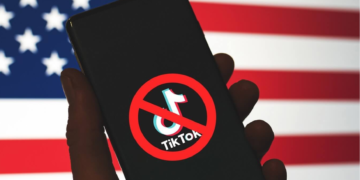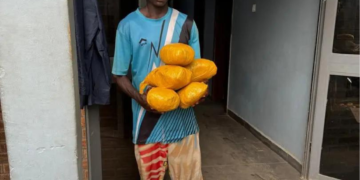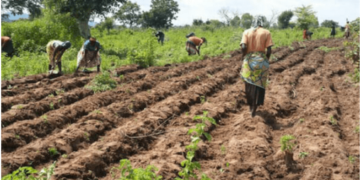LABORATORY analysts have expressed worry over the current cholera outbreak impacting Lagos and Ogun states, urging the governments at all levels to take immediate action to protect public health by deploying Public Analysts to conduct comprehensive water quality testing in the affected areas. This came as the Osun State government, yesterday, insisted that the state is yet to record any incident of cholera.
The Laboratory analysts, under the auspices of the Society of Testing Laboratory Analysts of Nigeria, SoTLAN, blamed the deaths from the outbreak on inadequate public awareness of the remote and immediate causes, as well as the preventive measures, highlighting the critical need for immediate action to safeguard public health.
The President of the society, Olugbenga Ogunmoyela, in a statement, said it is only when such water and sanitation outlets have been properly sampled and tested, that directional measures can be taken to arrest the outbreak and prescribe future actions.
Ogunmoyela said: “To address this urgent public health crisis, therefore, SoTLAN hereby emphasises the importance of mobilizing Public Analysts to conduct thorough testing of water sources, including wells, boreholes, and municipal supplies (where available) in all the affected areas.
Public Analysts in both public and private sectors possess the skills and expertise required to identify and mitigate such contamination or other pre-disposing factors. Their involvement is therefore crucial in guiding the ongoing discourse and implementation of remedial measures, including disinfection and provision of safe drinking water and public sensitization to the predisposing factors after analysis.
SoTLAN is confident that with the proper engagement and support, these professionals can play a key role in containing the outbreak and preventing future occurrences. We urge the authorities to act promptly in commissioning Licensed Public Analysts and implementing necessary measures. Together, we can overcome this challenge and ensure the well-being of our communities.”
Reported cases of 11 outbreaks inaccurate —Osun govt
Meanwhile, the Special Adviser to Governor Ademola Adeleke on Health Matters, Dr Adekunle Akindele, stated that the reported cases of 11 outbreaks were inaccurate. Akindele, in a statement, said: “Osun State Government through the Ministry of Health has proactively reactivated and established the Public Health Rapid Response Team, PHRRT, and Cholera Technical Working Group, CTWG, respectively, to ensure adequate surveillance and risk communication activities to guarantee the health of the citizens.
Though Osun is yet to record any confirmed case of Cholera, adequate preventive measures have been put in place to prevent the occurrence and respond to the outbreak in case we eventually record a case. 13 sample(s) collected so far. All 13 samples sent to a laboratory, of which 13 (100%) were negative, 0 positive and no pending result,” he pointed out, adding that “Cholera RDT kits and Transport media has been strategically distributed to some Health Facilities across the 30 LGAs.”
Govs warned against diverting PHCs fund
Meanwhile, a former lawmaker in Osun State, Mr Olatunbosun Oyintiloye, yesterday, warned the State Governors in the country not to divert the money given to states by President Bola Tinubu for rehabilitation of primary healthcare centres across the country. President Tinubu had released N260 billion to revitalise Primary Healthcare Centres, PHCs, across the country through the State Governors.
Oyintiloye, in a statement, said: “I commend the president for prioritising the health of Nigerians with the release of N260 billion to revitalise the dilapidated PHCs in the country. The only fear I have now is how this fund will not be diverted by the governors during this critical period of cholera outbreak.”
He further emphasized the importance of transparency and accountability in the utilization of these funds. “It is crucial that the funds are used for their intended purpose, which is to improve the primary healthcare infrastructure and services. Diverting these funds would not only be a disservice to the citizens but also a significant setback in the fight against cholera and other preventable diseases,” Oyintiloye added.
The former lawmaker called on civil society organizations, the media, and the general public to be vigilant and hold the governors accountable for the proper use of the funds. “We must all play our part in ensuring that the funds are used effectively and efficiently to improve the health outcomes of our people,” he said.
Public Health Experts Call for Comprehensive Approach
Public health experts have also weighed in on the cholera outbreak, calling for a comprehensive approach to tackle the issue. Dr. Ifeanyi Nsofor, a public health physician, stressed the need for a multi-faceted strategy that includes improving water and sanitation infrastructure, public education, and robust surveillance systems.
“Cholera is a disease that thrives in environments with poor sanitation and inadequate access to clean water. To effectively combat this outbreak, we need to address these underlying issues. This means investing in water and sanitation infrastructure, educating the public on proper hygiene practices, and strengthening our surveillance systems to quickly detect and respond to new cases,” Dr. Nsofor said.
He also highlighted the importance of community engagement in the fight against cholera. “Communities must be actively involved in the efforts to prevent and control cholera. This includes educating them on the importance of using clean water, proper waste disposal, and seeking medical attention promptly if they experience symptoms of cholera,” he added.
Government’s Role in Cholera Prevention
The government has a critical role to play in preventing and controlling cholera outbreaks. This includes providing the necessary resources and support to public health agencies, ensuring that water and sanitation infrastructure is in place and functioning properly, and implementing policies that promote public health.
Dr. Amina Abubakar, a public health policy expert, emphasized the need for a coordinated response from all levels of government. “The federal, state, and local governments must work together to address the cholera outbreak. This includes providing the necessary funding, resources, and support to public health agencies, as well as implementing policies that promote public health and prevent the spread of cholera,” she said.
She also called for increased investment in public health infrastructure. “We need to invest in our public health infrastructure to ensure that we are prepared to respond to outbreaks like this. This includes improving our water and sanitation systems, strengthening our surveillance and response capabilities, and ensuring that our public health workforce is adequately trained and equipped,” Dr. Abubakar added.
The Role of International Organizations
International organizations also have a role to play in supporting Nigeria’s efforts to combat the cholera outbreak. The World Health Organization (WHO) and other international health agencies can provide technical assistance, funding, and other resources to support the country’s response efforts.
Dr. Matshidiso Moeti, WHO Regional Director for Africa, emphasized the importance of international cooperation in addressing the cholera outbreak. “Cholera is a global health issue that requires a coordinated international response. The WHO is committed to supporting Nigeria in its efforts to combat the cholera outbreak and prevent future occurrences. This includes providing technical assistance, funding, and other resources to support the country’s response efforts,” she said.
She also highlighted the importance of sharing best practices and lessons learned from other countries that have successfully controlled cholera outbreaks. “We can learn a lot from other countries that have successfully controlled cholera outbreaks. By sharing best practices and lessons learned, we can improve our response efforts and prevent future outbreaks,” Dr. Moeti added.
Conclusion
The cholera outbreak in Lagos and Ogun states is a serious public health issue that requires immediate and coordinated action from all levels of government, public health agencies, and the international community. By mobilizing Public Analysts to conduct comprehensive water quality testing, improving water and sanitation infrastructure, educating the public on proper hygiene practices, and ensuring the proper use of funds allocated for primary healthcare, we can effectively combat this outbreak and prevent future occurrences.
It is crucial that all stakeholders work together to address the underlying issues that contribute to cholera outbreaks and implement sustainable solutions to improve public health. With the proper engagement and support, we can overcome this challenge and ensure the well-being of our communities.
























